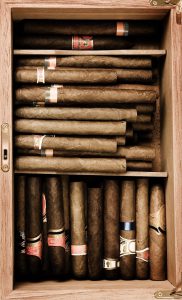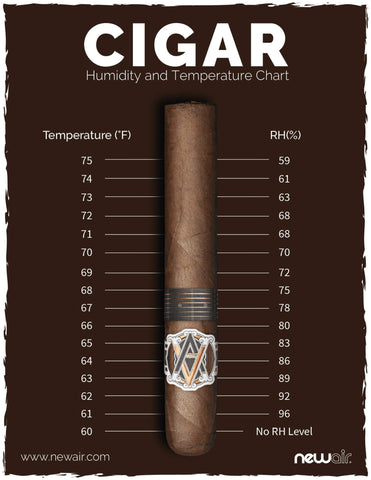Storing Cigars 101: How to Get Started
Whether you got your first taste of a fine cigar from a generous best man at a wedding or had a puff while touring Central America or the Caribbean, becoming a cigar aficionado is a bit like falling in love. You may be skeptical at first, but once you take the leap, you’re probably in for keeps.
Once you start collecting cigars, though, you need a place to store them — and a simple Tupperware container isn’t enough. Like any fine wine or antique, good cigars require just-right conditions to stay properly maintained over time. Cigars will whither and dry up if you don’t give them the care and attention they need. Just as you need to do some work to maintain a relationship after the initial infatuation period, so too must you take the time to make sure your cigars are properly stored if you expect them to last for an extended period.
For novice cigar collectors, taking into account all the conditions required for proper cigar storage can feel overwhelming. Long-time cigar aficionados have strong opinions on the subject, and they don’t always agree. While there’s plenty of room to learn all the fine details about different cigars as you advance in your hobby, right now you need a guide for storing cigars that takes the mystery out of the process.
Here you go: your guide to storing cigars when you’re just getting started.

Everything You Need to Know About Storing Cigars for Beginners
Because cigars are made from organic materials — that is, tobacco leaves — they are subject to decay over time. The tobacco in cigars has been harvested, cured and fermented to achieve a certain flavor and aroma, and to help preserve the leaves. While curing dries the leaves, the fermentation process requires them to be kept moist. Once the process is complete, the tobacco in cigars can last for years — but only if they are stored at the proper temperature and humidity levels.
Proper Temperatures for Cigar Storage
In general, cigars are best stored in conditions that match the location where they were made. That means the mild temperatures of a Caribbean island, where they don’t have four seasons and never have to deal with ice and snow. In general, the best temperatures for your cigars are what you would find in the shade in these regions: somewhere between 62 and 72 degrees Fahrenheit is your goal.
That said, many cigar fans will work hard to keep their cigars at 70 degrees year round. This is the first half of the “70/70 rule,” which states that cigars are best stored at 70 degrees Fahrenheit and 70 percent relative humidity. That’s easy to remember and is a great rule of thumb when you’re starting out, since these conditions will keep your cigars in great shape for long-term storage and smoking.
Why Temperature Control Is Important for Cigars
Storing cigars in too warm or too cool an environment can lead to problems. When cigars are kept at sustained temperatures above 72 degrees, the warmth can trigger tobacco beetle eggs to hatch. The larvae will eat the organic material in your cigars and begin to grow and wriggle around your cigar collection — definitely something you don’t want to see! For this reason, cigars are kept in an air conditioned, sealed environment in warm climates.
On the other hand, cold air doesn’t hold humidity well. This is why many people use a humidification device in their homes during a long, cold winter — the air can be as dry as in the desert at times. It’s easier to maintain the proper humidity for your cigars over a long period when the temperatures are mild rather than very cold, so people in cool areas often look for a cigar storage system with a heater
Learn More: Electronic Humidor, Climate Controlled with Lock | NewAir CC-100H
Proper Humidity for Cigar Storage
Humidity is just as important as temperature when it comes to storing cigars for the long term — if not more important. In order for a cigar to light and smoke properly, the humidity needs to be just right. In general, about 12 to 14 percent of a cigar’s total weight should come from moisture — a number that corresponds to an overall relative humidity of 68 to 72 percent.
Relative humidity varies based on air temperature. As mentioned above, hot air tends to hold more moisture than cold air, but changes in temperature will alter the overall percentage of relative humidity, even if you don’t add or subtract moisture in your storage area. This is why it is important to control for both temperature and humidity at the same time.
Why Properly Humidified Cigars Last Longer
If your cigar is too dry, it will shrivel and the wrapper can come undone. Dry cigars also lose much of their flavor and aroma as essential oils are lost to the atmosphere. Plus, a dry cigar acts more like kindling for a fire and lights up very quickly. This will cause your cigar to burn hot and fast, which will significantly limit your enjoyment.
If your cigar is too moist, other problems can develop. Excess humidity encourages tobacco beetles to thrive, since they love hot, humid conditions. Excess moisture can also foster mold and mildew growth, which will spoil the cigar. Finally, the dry leaves of a cigar want to absorb water; excess water in the air flow will cause them to expand in size, potentially breaking the wrapper and ruining the entire cigar.

Striking the Right Balance
As a general rule of thumb, the 70/70 rule helps you keep a good balance of heat and humidity for your premium cigar collection. However, you may find through trial and error that you prefer a slightly lower or higher moisture level to get the perfect smoke when you light your favorites. If you plan to experiment with the humidity, you’ll also need to adjust the temperature to keep things balanced for your cigars. Likewise, raising or lowering the temperature should also come with an adjustment to the relative humidity.
In general, the warmer you keep your cigars, the lower the humidity should be, and the cooler you keep your cigars, the higher the humidity should be. To avoid costly experiments that could lead to losing your cigars to beetles and mold — or inadvertently ruining the flavor — use the values on this chart to strike the right balance between temperature and humidity for cigar storage:
Long-Term Cigar Storage Tips
Once you get the temperature and humidity right, there are a few other things to consider when it comes to keeping your smokes as fresh as they were at the cigar shop:
- If you plan to carry cigars with you regularly, it’s best to keep the wrappers on. This will protect them on their journey so the wrappers don’t end up cut or split. A small plastic bag may help keep things contained as well.
- If you plan to age your cigars, unwrap them to allow the flavors and humidity to blend in storage. This works especially well in a humidor lined with Spanish cedar, an element you can find in both small and large humidors.
- Consider opening only the end of the wrapper to allow some air circulation in storage while still having the option of grabbing some cigars for easy transport.
- Check humidity levels regularly, especially if temperatures in your home change with the seasons or even over the course of the day. This will allow you to make adjustments as required and catch problems before they develop.
- Use only distilled water to add humidity; this will keep tap water impurities from altering the flavor of your cigars and/or encouraging mold growth in your cigar boxes.
- Keep your cigars out of direct sunlight to avoid UV rays breaking down the product over time. You should also keep your cigar storage system away from direct sunlight to help maintain a steady temperature throughout the day.

How to Choose a Humidor for Your Cigar Collection
The Last Word
If you’re thinking to yourself that it would be impossible to keep your cigars happy on a shelf in your home, you’re right. Most cigars come in a wooden box and are wrapped in cellophane, but these protections are meant for taking them home from a cigar retailer, not for long-term storage. To maintain just the right temperature and humidity, you’ll need a permanent or travel humidor that allows you to control both.
A humidor is generally a box or cabinet with a tight enough seal to allow for good climate control. The best humidors have a thermostat that will allow you to adjust the temperature as needed and air conditioning and/or heating. You can choose which you need based on your climate, or you can choose a more expensive humidor with both to ensure perfect storage conditions for your cigars.
A humidor, as its name suggests, will also provide a humidifying element. This can be as simple as soaking a new sponge in distilled water and keeping it in a reservoir inside the humidor, or it could be as complex as an electronic humidifier with a digital hygrometer and fan functions to circulate air inside. All good humidors will have at least an analog hygrometer to let you know the humidity inside. Be sure to check this at least every two weeks so you can make adjustments to your damp sponge in time to keep your cigars in good condition.
As you shop for a humidor, consider its capacity — then and size up. Most true cigar enthusiasts end up expanding their collections, and you’ll want to have plenty of space for your new hobby.

Cigars require careful climate control to look, smell and taste their best when you finally light them. If you plan to collect and store cigars for longer than just a couple of weeks, you should invest in a humidor that allows you to control the temperature and humidity for long-term storage. Begin with the 70/70 rule and make tweaks from there depending on your tastes, and you can enjoy a perfect cigar any time you like.


0 comments